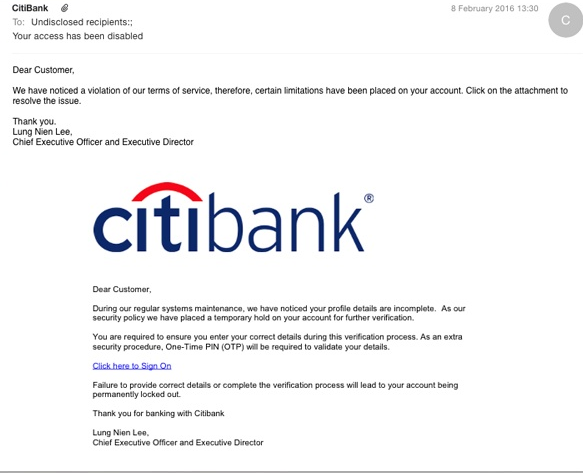What is CitiBank virus?
CitiBank virus refers to spam emails that claim to be from financial institution CitiBank. The emails are part of a spam campaign that aims to distribute the Emotet banking trojan. This is by far not the first spam campaign used for this purpose, and it certainly won’t be the last. Getting your computer infected with Emotet can have pretty serious consequences, as it can steal your financial information, which could lead to money loss. 
Spam is often used to distribute malware, as sending spam costs close to nothing, and a lot of people still open spam emails. Simply opening the email won’t do anything harmful, but the problems start when users click on links or/and open email attachments. Once an infected file has been opened, malware can freely execute its malicious activity. In many cases, spam emails spread either file-encrypting ransomware, or banking trojans. In this case, it’s a banking trojan.
If you received a suspicious CitiBank email, but did not open an attachment or press on a link, you should be fine. Just delete the email. However, if you did open something, you will need to scan your computer with anti-malware software to check whether your computer is infected or not. If it is indeed on your computer, you need to delete CitiBank virus.
How to differentiate between spam and legitimate emails
Generally, spam emails are pretty obvious. They’re less obvious if you do not know the signs, but most people can easily tell that they’re fake. One of the first signs is how you are addressed. In the case of CitiBank, if the bank were to email their existing customer, they would use their name. There would be no Dear Customer, Account Holder, User, Member, etc. Whenever said greetings are used, it automatically makes the email look suspicious.
Grammar mistakes are also a huge giveaway. There usually is plenty of them is spam email, and it’s always been a mystery whether it’s intentional or not. Obviously, emails from a bank or any other legitimate sender will not have mistakes in them. The sender’s email address can also reveal whether you’re dealing with spam or not. If the sender claims to be from CitiBank, check the that sender’s email matches one actually used by the bank. If it’s some random combination of letters, or if it resembles a legitimate email but has one different letter, it’s spam. Probably a malicious one at that.
You should be wary of links and attachments. As a general rule, do not click on any links in emails and instead access the sites manually. And when it comes to file attachments, first scan them with anti-malware software and only then open them.
What malware does the CitiBank spam email spread
As we mentioned above, Emotet is the malware that is being distributed by the malicious CitiBank spam emails. The banking trojan is pretty dangerous because it can steal your banking information, which would lead to money loss. The malware can intercept, record and save outgoing network traffic via web browser, which would include not only your banking information, but also other login credentials.
CitiBank virus removal
You don’t need to do anything if you did not open the attachment or click on the link. However, if you did, you need to use anti-malware software to remove CitiBank virus. Manual CitiBank virus removal is not recommended as you could end up doing more damage.
Offers
Download Removal Toolto scan for CitiBank virusUse our recommended removal tool to scan for CitiBank virus. Trial version of provides detection of computer threats like CitiBank virus and assists in its removal for FREE. You can delete detected registry entries, files and processes yourself or purchase a full version.
More information about SpyWarrior and Uninstall Instructions. Please review SpyWarrior EULA and Privacy Policy. SpyWarrior scanner is free. If it detects a malware, purchase its full version to remove it.

WiperSoft Review Details WiperSoft (www.wipersoft.com) is a security tool that provides real-time security from potential threats. Nowadays, many users tend to download free software from the Intern ...
Download|more


Is MacKeeper a virus? MacKeeper is not a virus, nor is it a scam. While there are various opinions about the program on the Internet, a lot of the people who so notoriously hate the program have neve ...
Download|more


While the creators of MalwareBytes anti-malware have not been in this business for long time, they make up for it with their enthusiastic approach. Statistic from such websites like CNET shows that th ...
Download|more
